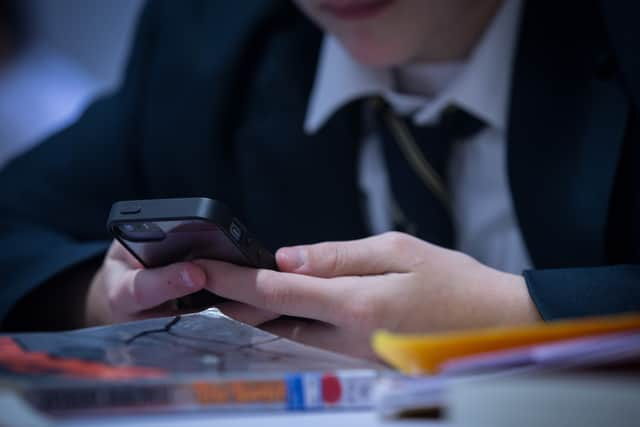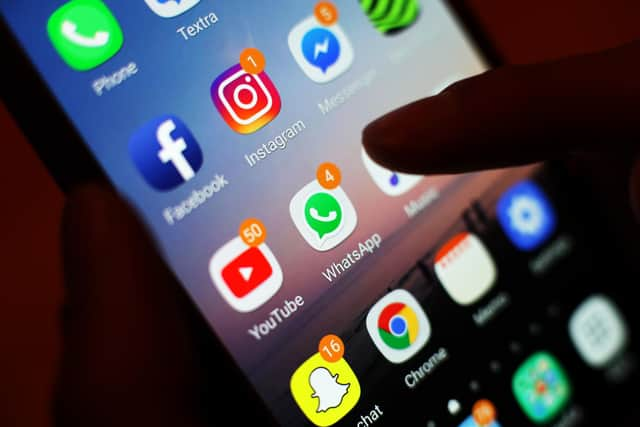I'm a former teacher, this is what I make of the school mobile phone ban
and live on Freeview channel 276
Schools across Sunderland have recently been given a Government directive to ban the use of mobile phones during the school day.
The announcement was followed by the Education Secretary Gillian Keegan appearing on a whole host of media outlets promoting the hard-hitting policy as a signal of the Government clamping down on disruption in schools.
Advertisement
Hide AdAdvertisement
Hide AdMs Keegan said that mobile phones have “no place” in a school day and vowed the policy would “reset the social norm” and improve behaviour.


It was a policy announcement which made the headlines but didn’t really resonate in schools; not because it wasn’t without some merit, but because to all intents and purposes it’s rule already being implemented.
I worked as a teacher in various roles and schools for 17 years and have never experienced any behaviour policy which allows students to decide to use their own mobile phones in lessons.
While the motive and necessity of the Government’s directive can be questioned there’s certainly validity in the disruptive impact mobile phones can have and more importantly the damage misuse of the apps and online platforms can have on children and teenagers.
Advertisement
Hide AdAdvertisement
Hide AdIn the schools in which I worked, phones were not banned outright, but they were not allowed out in classrooms and any phone confiscated was put in an envelope and sent to reception where it had to be collected by the parents rather than the child.
The theory being the inconvenience caused to the parents will help to foster support from home in ensuring their children don’t misuse their phones in school.
However, like any school rule, there will always be a small proportion who will look to challenge expectations and when it came to confiscating phones, compared to other items, this was always an area which saw greatest pupil resistance which could lead to conflict between staff and children.
Unlike a jacket or pair of trainers, the resistance is a result of how personal their phone is to them.
Advertisement
Hide AdAdvertisement
Hide AdThis obviously leads to the question of whether there should just be an outright ban on even bringing phones into schools?
The school in which I spent most of my career operated a policy of an outright ban on children bringing phones on our annual ski trip.
As well as helping to mange home sickness, the policy was designed to prevent parents getting inaccurate or exaggerated messages second-hand from either the child or one of their friends.
You can imagine the panic if a parent received a message from the friend of a child that their son or daughter had gone to hospital with an injury on the slopes - which in many cases turned out to be very minor and was communicated once medical help had been sought and we as a staff knew all the facts.
Advertisement
Hide AdAdvertisement
Hide AdThe principle of preventing the relay of second-hand inaccurate messages also supports the case for an outright ban on phones being brought into schools.
However, as a parent, I would now like the security of knowing my child has their phone and a means of contacting me, whether that be having been injured on the slopes in the Alps or missed the bus at the end of the school day.
An outright ban also removes the educational benefit of using mobile phones as an important learning tool.
A mobile phone enables children to have the power at the end of their fingertips to research their own information, use a range of educational apps as well as using their camera for video and photographs to record information.
Advertisement
Hide AdAdvertisement
Hide AdAs such, it was a tool which I would often give permission to use and indeed encouraged children to do so.
Cyberbullying
The new directive is also being implemented to help tackle the misuse of mobile phones and cyberbullying. It’s less than six years since I was last in the classroom and at that point cyberbullying was certainly a reality rather than a concept.


I certainly recall speaking with members of my tutor group who arrived to school upset about messages posted by other students on a range of online platforms.
The issue became part of our personal, social, health and economic (PSHE) education curriculum which also included police visits to speak with children about the dangers of online abuse and grooming.
Advertisement
Hide AdAdvertisement
Hide AdHowever, any issues of cyberbullying I encountered had taken place outside the school day, with teaching staff left with the task of dealing with the fallout the following day.
As such, banning mobile phones in school won’t solve this problem, with children and teenagers free to post what they want outside the school day.
With little apparent regulation of comments on social media platforms and what appears to be a ridiculously young registration age, in most cases, of 13, perhaps the Government would be better served investing their time in tackling the online platforms where the vast majority of this cyberbullying takes place.
Going back to my original point, the fanfare surrounding the Government’s directive to ban the use of mobile phones in schools appears to be born out of political point scoring rather than any real educational substance.
Comment Guidelines
National World encourages reader discussion on our stories. User feedback, insights and back-and-forth exchanges add a rich layer of context to reporting. Please review our Community Guidelines before commenting.